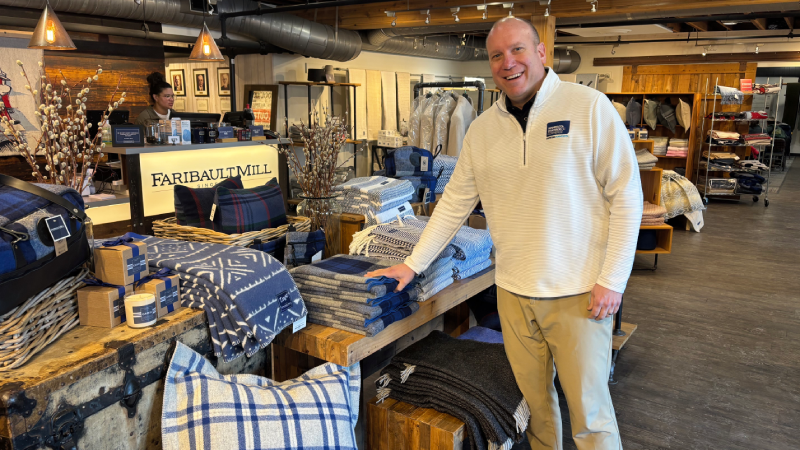President Donald Trump’s tariffs are leaving small enterprise homeowners questioning if they will sustain with new potential disruptions within the provide chain.
Trump introduced 25 p.c tariffs on Mexico and Canada in late January, together with a ten p.c tariff on China in retaliation for claims round weak border safety and fentanyl smuggling in these international locations.
Canada and Mexico’s tariffs had been paused for the following month as negotiations proceed, whereas talks with Chinese language officers are ongoing. Nevertheless, the risk nonetheless looms – particularly as Trump and vice chairman J.D. Vance have emphasised the necessity for a return to home commerce and manufacturing in the USA.
On-line retailers face powerful circumstances
For small enterprise homeowners, the impression of those tariffs – although paused – is being made obvious virtually instantly.
Forrest Webber owns The Commerce Desk, a web-based residence enchancment retailer that provides every part from bathtubs to fridges. The Commerce Desk’s provide chain comes from “throughout” with the location that includes over 100 manufacturers from Canada, the USA, China and different international locations.
One Canadian provider reached out to tell Webber of a 25 p.c worth hike earlier within the week – a transfer that was walked again upon the tariff pause a day later.
Even so, home equipment will seemingly be hit exhausting by future tariffs. Electronics, equipment elements and uncooked supplies equivalent to metal are all sourced from international locations focused by the tariffs. Half of the suppliers for The Commerce Desk’s home equipment are exterior the USA.
“We’ve dug ourselves in a deep gap over the previous 50 years. Every little thing’s outsourced,” Webber says. “Simply going off of home equipment, lots of it’s sourced out of China.”
Value hikes are on the menu
The USA’ enterprise ecosystem, because it stands, is closely depending on outsourcing. Cheaper abroad supplies, items and labor have incentivized suppliers and wholesalers to shift their provide chains internationally, drying up demand for US-based suppliers.
Take minimize flowers, for instance. 80 p.c of the flowers equivalent to roses are imported from international locations in Central America and Africa. The place California and Colorado as soon as dominated the minimize flower market and equipped nearly all of American floral calls for, commerce agreements that lowered taxes and inspired commerce with Colombia and different international locations supplying minimize flowers rapidly outpaced home growers.
Now with tariffs coming into play, and with the Trump/Vance administration transferring on its guarantees to push manufacturing and manufacturing again to the USA, small companies depending on the decades-old world provide chain are left scrambling.
For restaurant homeowners like Raul Luis, who owns the Birrieria Chalio restaurant chain in Texas and California, the tariffs are rising prices on a number of fronts.
EXPAND
Each Birrieria Chalio’s serve a wide range of Mexican dishes, together with handmade tacos, menudo and birria – almost all of which have elements sourced from Mexico and Canada.
Luis will get beef tripe for menudo from each Mexico and Canada, together with particular beef cuts for stews and tacos. Fruit and veggies – equivalent to avocados for guacamole and mangoes and tomatoes for salsa – additionally come from Mexico. He additionally depends on paper items from China for takeout containers and cutlery.
Luis ready for the attainable tariffs in late 2024, ordering paper merchandise for takeout containers in bulk to keep away from worth will increase. However these provides will run out ultimately, and Luis can’t replenish on contemporary objects like avocados and lettuce forward of time.
Luis’ restaurant provider warned their prospects forward of time that pricing would enhance dramatically. “They stated to anticipate worth will increase,” Luis stated. “And we’re going to must cross it on to the patron.”
Luis is considering including a takeout surcharge for the additional paper provides used for takeout containers, downsizing the restaurant’s choices and probably even taking costs off of the menu altogether to adapt to quickly altering prices.
Luis says the value will increase might create a “ripple impact” within the restaurant trade, as eating places navigate balancing their buyer’s wants and sustaining revenue margins which are skinny even in the very best of instances.
That is coming on the tail finish of an extended interval of inflation, the place worth hike-weary prospects have gotten tighter with their wallets because the financial local weather turns into extra unsure.
“I believe customers are scared,” Luis stated. “They wish to maintain on to their disposable revenue.”
Within the meantime, Luis anticipates it’ll take “some time” for the provision chain and the meals trade to adapt.
“There are going to be some pains,” he stated. “Eating places should get artistic, or we’re going to have to coach the patron.”
Tariffs depart Made within the USA producers unruffled
Not all companies have been hit exhausting by the tariffs. For Ross Widmoyer, president and CEO of Faribault Mill in Minnesota, “Made within the USA” is the motto for the complete provide chain.

EXPAND
Faribault Mill is what Widmoyer calls a “vertically built-in” model. The corporate sells woolen blankets, sheets, winter put on and different wool objects – almost all of that are processed, woven, dyed and packaged totally inside the USA.
Whereas the mill does import some materials from New Zealand, switching wouldn’t be a problem – to the purpose the place roughly “95 p.c” of Faribault’s stock is American-sourced.
“Our provide chain is fairly properly shored up domestically,” Widmoyer says.
Working an all-American firm isn’t straightforward. The corporate’s 160-year legacy has given the corporate a runway and a legacy to work off of, from its long-term suppliers to its gear. Faribault’s equipment requires a crew of skilled mechanics to restore and run easily, which requires generational information handed down from employee to employee – a few of whom have been working for Faribault for generations.
“We’ve individuals who have been working on the mill for his or her total profession, and their dad and mom did it, and their grandparents did it as properly,” Widmoyer says.
The payoff, Widmoyer says, has been substantial. Faribault – named for the city it resides in – has been a serious supply of jobs and revenue for the city and surrounding areas.
Whereas Faribault’s mannequin is one to aspire to, the transitional interval small companies are dealing with now gained’t be a fast or a simple one.
“There are all the time obstacles to entry in each trade. To provide domestically, there’s a moat to entry,” Widmoyer says.
Ought to the tariffs come into impact, relocating manufacturing vegetation and uncooked materials suppliers to the USA will take time, throughout which small companies should navigate restricted provide and costs heightened by tariffs.
Discovering expert employees is one other problem, Widmoyer says – particularly as institutional information of mechanics and fabrication has been misplaced as manufacturing moved abroad.
“If we will train and practice folks to like being a part of a producing firm like ours, it might a be a terrific finish end result,” Widmoyer says. “They’re necessary jobs. These folks depend upon them and these communities rely on them””
Tariffs spell woe for specialty items companies
Whereas turning to home suppliers could also be an answer for some companies, for Heather Perry, CEO of California espresso firm Klatch Espresso, utilizing an American provide merely isn’t attainable.

EXPAND
Whereas some espresso is grown in Hawaii and sure elements of California, it’s not sufficient to maintain up with Individuals’ each day caffeine wants. Many of the world’s espresso is grown close to the equator, making imports a necessity.
“I’d find it irresistible if tariffs didn’t apply to espresso,” Perry says. “It’s simply not one thing the US can compete in.”
Espresso costs have already doubled over the previous three months on account of a mixture of environmental elements and market squeezes. Trump’s newest spherical of tariffs places Perry and Klatch Espresso in a troublesome place – elevate costs and lose prospects, or proceed to see her revenue margin shrink.
“It’s exhausting for customers to see costs creep up month-to-month,” Perry stated. “It’s actually a fragile steadiness.”
Perry has tried to strike that steadiness by introducing will increase on a extra rare scale, if solely so her prospects don’t see their each day cup of joe getting dearer by the week. In the meantime, she’s keeping track of how the tariff state of affairs develops after the pause ends.
“No person is aware of what’s occurring,” she says. “We don’t know what to anticipate.”
Uncertainty and hope for enterprise homeowners
How the tariff state of affairs will develop stays to be seen, leaving small enterprise homeowners at the hours of darkness as they consider their pricing and their provide choices.
Nevertheless, as the fragile steadiness of the worldwide provide chain – and of America’s previously domestic-focused financial system – turns into extra obvious, tariffs might signify a change for the higher.
Whereas tariffs will hike the costs of his home equipment, Webber expressed a need to supply extra merchandise in the USA.
“I dwell right here. I’d slightly preserve the funds flowing,” he stated. “I can positively see it coming again to the US, nevertheless it’s going to take a very long time.”
Whereas Luis anticipated some rising pains because the restaurant trade adapts, he expressed hope that the tariffs might push a shift to US-based suppliers and producers, fueling the American job market.
“I’m very hopeful,” Luis stated. “I pray the administration has extra data than we do, and that they’re making the fitting strikes. The place there’s a fireplace, there’s rebirth.”





